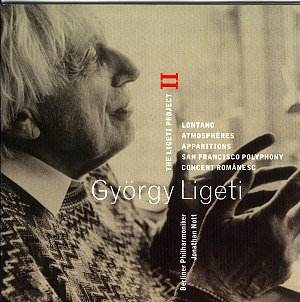This release represents Volume 2 of the new Teldec
Ligeti Project. It could well prove to be the most popular, containing
as it does some of Ligeti’s most famous pieces, as well as a couple
of important premiere recordings.
Leaving aside the Romanian Concerto (one of
those premiere recordings, a product of his early post-war years in
Bucharest), the disc is made up of what the composer calls his "…
four western pieces for large orchestra … the works that best illustrated
my quest for new, unique and extreme solutions". It is probably
best to start with the two pieces purloined by Stanley Kubrick for 2001,
A Space Odyssey, as this film was largely responsible for getting
Ligeti’s sound-world to a larger public. Lontano and Atmosphères
are both given performances of the utmost virtuosity by the Berlin Philharmonic,
and it is interesting to compare them with the only serious competition,
a benchmark 1994 disc from Abbado and the VPO entitled ‘Wien Modern’,
and featuring these two works along with pieces by Nono, Rihm and Boulez.
Where Abbado (not unsurprisingly) goes for lean, clear textures, with
individual lines clearly audible through the ‘clouds’ of sound, Jonathan
Nott revels in the sheer weight of tone at his disposal, producing a
sound that is truly thrilling in its sumptuousness. These works exemplify
Ligeti’s move towards ‘texture’ music, where clusters of adjacent sounds
are used to achieve slow, seamless change, and the massed strings of
the Berlin orchestra, particularly in Atmosphères, produce
the kind of preternatural glow that the composer must surely have had
in his mind when conceiving the piece. Abbado is a good tonic to this
performance, but there is no question as to which one I will return
for an amazing aural experience, helped by a recording of spectacular
dynamic range.
It is astonishing to realise that the piece that effectively
launched Ligeti, Apparitions, is here receiving its first recording.
The scandalous premiere took place in Cologne in 1960 under one of the
composer’s early champions, Ernest Bour, who made a number of pioneering
Ligeti recordings for Wergo. The piece seemed to be resigned to textbook
references, so it is a cause for celebration that we are now able to
judge it properly in Jonathan Nott’s superb performance. The work is
in two short sections, each giving a tantalising glimpse of Ligeti’s
early experiments with ‘micropolyphony’. The deep, low bass opening
is full of the sort of foreboding that bears out his famous quote –
"I am permanently scarred; I will be overcome by revenge fantasies
to the end of my days". This outlook was formed by his experience
of two dictatorships, Hitler and Stalin, and the restless second movement,
which provides an effective contrast to the uneasy stillness of the
first, shows a composer struggling to make his uniquely original voice
be heard.
The teeming figurations that characterise San Francisco
Polyphony show us the same composer fully in command of his genius.
The piece comes from nearly two decades after Apparitions but
is recognisably the work of the same hand and brain. Here we get more
‘clocks’ than ‘clouds’, and the bustling nature of a large, cosmopolitan
American city (the inspiration for many other composers) is evoked with
this composer’s unmistakable touches. It would be interesting to know
what the members of the Berlin Phil. made of the piece, for there is
no doubting their commitment in what must have been less-than-familiar
music to them.
The last work is hardly mentioned even in textbooks.
The Romanian Concerto is a product of Ligeti’s early experiments
in the transcribing of folk material from wax cylinders and sounds as
if it could have been written by Bartók or Kodaly. Despite this,
or maybe because of it, it is a piece of great interest, especially
given the path that Ligeti eventually took. Ligeti displays his debt
to Bartók even in his mature music (particularly the Piano
Concerto and Etudes), and it is particularly affecting to
hear the young composer thoroughly mastering his great predecessor’s
mix of folk song and rhythmic vitality – the last movement’s Molto
vivace could be straight out of Bartók’s Concerto for
Orchestra. This immaturity does, of course, mean it is unlikely
to be heard in the concert hall, and is therefore all the more valuable
on disc, especially in a performance as infectious as this. Is it possible
the Berliners were revelling in being able to play some ‘straight’ music
at last, I wonder?
The notes, as ever in this series, are by the composer
and as authoritative as one can get. The recordings, two of which are
‘live’ (though you can hardly guess) are wonderfully detailed and vivid,
real demonstration stuff. Whether you are a Ligeti fan or not, I heartily
recommend this – it’s worth it for the rare items and the sonic experience
alone!
Tony Haywood
